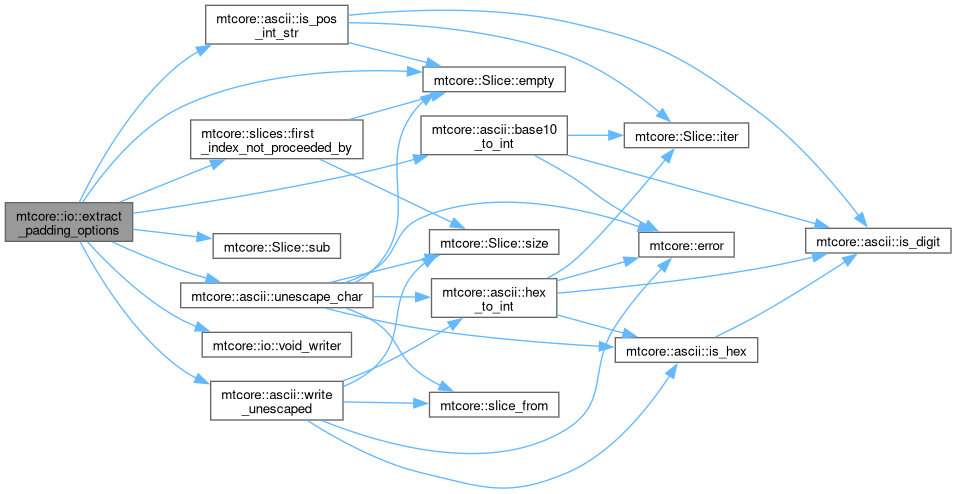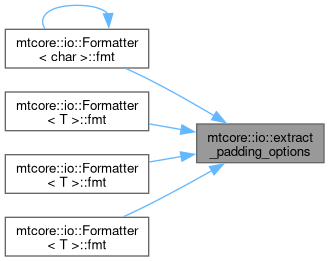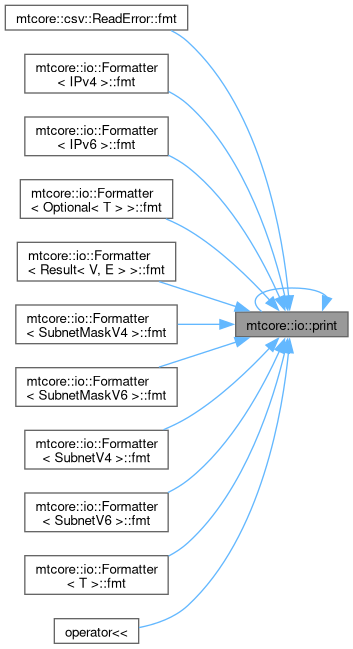Built-in formatting options and specifications. More...
Classes | |
| struct | mtcore::io::FormatOptions |
| Options for specifying formatting. More... | |
| struct | mtcore::io::Formatter< T > |
| Struct to override to specify how a type should be formatted. More... | |
| struct | mtcore::io::PaddingOptions |
| Represents parsed padding options for formatting output. More... | |
| struct | mtcore::io::Padded< T > |
| Formats data with padding into a writer's output stream Uses Formatter<T> under the hood Usually will use extract_padding_options to get padding options. More... | |
| struct | mtcore::io::Formatter< char > |
| Formatter for characters Format specifier options for output: More... | |
| struct | mtcore::io::Formatter< T > |
| Formats integer numbers (other than char) such as int, unsigned, long long, etc Format specifier options for output: More... | |
| struct | mtcore::io::Formatter< char * > |
| Format specifier for null-terminated char* (mutable C-strings) Has same format options as template<Iterable T> struct Formatter<T> More... | |
| struct | mtcore::io::Formatter< const char * > |
| Format specifier for null-terminated const char* (C-strings) Has same format options as template<Iterable T> struct Formatter<T> More... | |
| struct | mtcore::io::Formatter< Optional< T > > |
| Formatter for an optional Uses the formatter for the underlying value if available No formatting options. More... | |
| struct | mtcore::io::Formatter< Result< V, E > > |
| Formatter for a result Will check if the value has been moved out of the result Uses the formatter for the underlying value and/or error if available No formatting options. More... | |
| struct | mtcore::io::Formatter< IPv4 > |
| Formats IPv4 addresses No formatting options are available. More... | |
| struct | mtcore::io::Formatter< IPv6 > |
| Formats IPv6 addresses Formatting options: More... | |
| struct | mtcore::io::Formatter< SubnetMaskV4 > |
| Formats subnet v4 masks. More... | |
| struct | mtcore::io::Formatter< SubnetMaskV6 > |
| Formats subnet v4 masks. More... | |
| struct | mtcore::io::Formatter< SubnetV4 > |
| Formats a masked version 4 IP address with a subnet. More... | |
| struct | mtcore::io::Formatter< SubnetV6 > |
| Formats a masked version 6 IP address with a subnet. More... | |
Enumerations | |
| enum class | mtcore::io::ContentAlignment { mtcore::io::ContentAlignment::LEFT , mtcore::io::ContentAlignment::RIGHT , mtcore::io::ContentAlignment::CENTER } |
| Represents content alignment options for padded formatting options. More... | |
Functions | |
| Optional< PaddingOptions > | mtcore::io::extract_padding_options (Slice< const char > formatStr) |
Extracts padding options from a format string if present Padding options are in the following form: (padChar)(padDirection)(padLen); Where padChar is the character to pad with (maybe escaped with \ to avoid interpretation as a control character), padDirection is either < for left pad, > for right pad, or ^ for center padding, and padLen is an integer of the minimum length the output should be. | |
| template<WriterImpl WI, typename... Args> | |
| Result< size_t, typename Writer< WI >::ErrType > | mtcore::io::print (Writer< WI > &writer, const char *fmt, const Args &...args) |
Prints arguments using a format string Element insert points are designated by a pair of curly braces {} Format parameters can be between the curly braces (e.g. | |
| template<WriterImpl WI, typename... Args> | |
| Result< size_t, typename Writer< WI >::ErrType > | mtcore::io::print (Writer< WI > &writer, const Slice< const char > &fmt, const Args &...args) |
Prints arguments using a format string Element insert points are designated by a pair of curly braces {} Format parameters can be between the curly braces (e.g. | |
Detailed Description
Built-in formatting options and specifications.
Enumeration Type Documentation
◆ ContentAlignment
|
strong |
Represents content alignment options for padded formatting options.
| Enumerator | |
|---|---|
| LEFT | |
| RIGHT | |
| CENTER | |
Definition at line 35 of file formats.hpp.
Function Documentation
◆ extract_padding_options()
|
inline |
Extracts padding options from a format string if present Padding options are in the following form: (padChar)(padDirection)(padLen); Where padChar is the character to pad with (maybe escaped with \ to avoid interpretation as a control character), padDirection is either < for left pad, > for right pad, or ^ for center padding, and padLen is an integer of the minimum length the output should be.
Note that a semicolon at the end is required.
Examples:
0<12;- Left pads with zeros for up to 12 characters\^>14;- Right pads with carrots (^) for 14 characters^10;- Centers with spaces for 10 character length
- Parameters
-
formatStr Format string to parse
- Returns
- Padding options if present, or nullopt
Definition at line 71 of file formats.hpp.


◆ print() [1/2]
| Result< size_t, typename Writer< WI >::ErrType > mtcore::io::print | ( | Writer< WI > & | writer, |
| const char * | fmt, | ||
| const Args &... | args ) |
Prints arguments using a format string Element insert points are designated by a pair of curly braces {} Format parameters can be between the curly braces (e.g.
{d}) Escaping characters with backslash \ is supported See the Formatter<> specialization for the type of objects your formatting for their specific formatting string options
General pattern is as follows:
For iterables
- Element limit option (e.g.
5!to limit to 5 elements) - Full iterable padding option (e.g.
<12;to left pad to 12 with space) - Separator options, also serves as indicator of start of element options (e.g.
,:to join with comma) - Element option(s) with pipe
|separating each (e.g.x|d| <12;)
For paddable elements
- Padding in form of padding character (e.g.
.), padding direction (<,^, or>), padding length (12), padding terminator;
For numbers
dfor decimal,xfor hex,ofor octal,bfor binary
For print, the arguments may be of different types (e.g. 1, 4.5, "hello")
- Template Parameters
-
WI Writer implementation Args Arguments to format
- Parameters
-
writer Writer to write to fmt Format string to write with args Arguments to write
- Returns
- Number of bytes written, or error
Definition at line 482 of file io/writer.hpp.


◆ print() [2/2]
| Result< size_t, typename Writer< WI >::ErrType > mtcore::io::print | ( | Writer< WI > & | writer, |
| const Slice< const char > & | fmt, | ||
| const Args &... | args ) |
Prints arguments using a format string Element insert points are designated by a pair of curly braces {} Format parameters can be between the curly braces (e.g.
{d}) Escaping characters with backslash \ is supported See the Formatter<> specialization for the type of objects your formatting for their specific formatting string options
General pattern is as follows:
For iterables
- Element limit option (e.g.
5!to limit to 5 elements) - Full iterable padding option (e.g.
<12;to left pad to 12 with space) - Separator options, also serves as indicator of start of element options (e.g.
,:to join with comma) - Element option(s) with pipe
|separating each (e.g.x|d| <12;)
For paddable elements
- Padding in form of padding character (e.g.
.), padding direction (<,^, or>), padding length (12), padding terminator;
For numbers
dfor decimal,xfor hex,ofor octal,bfor binary
For print, the arguments may be of different types (e.g. 1, 4.5, "hello")
- Template Parameters
-
WI Writer implementation Args Arguments to format
- Parameters
-
writer Writer to write to fmt Format string to write with args Arguments to write
- Returns
- Number of bytes written, or error
Definition at line 529 of file io/writer.hpp.